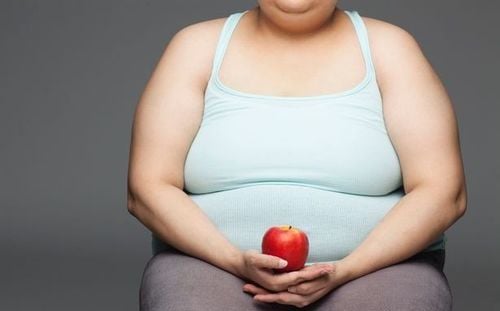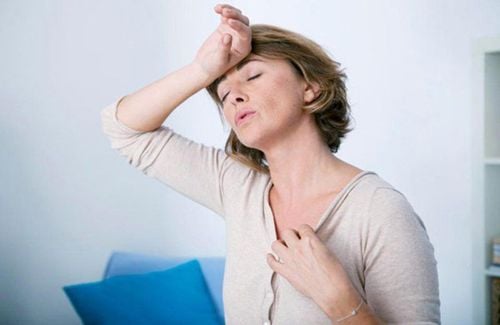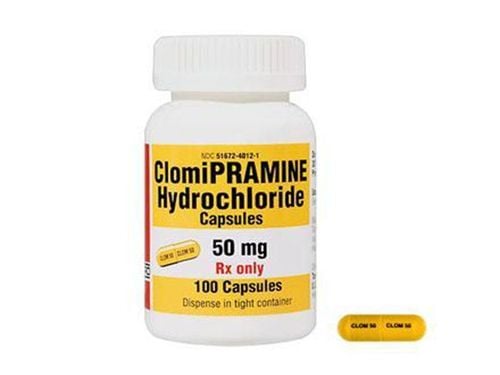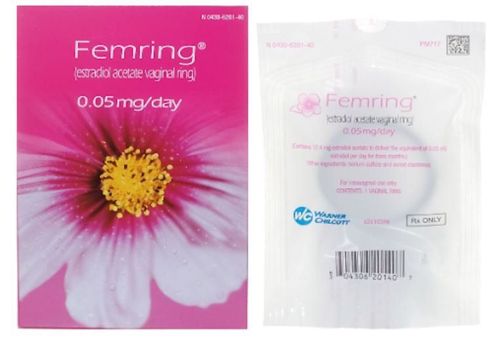This is an automatically translated article.
Hot flashes are one of the most common symptoms in menopausal women. In particular, obese subjects are the most likely to experience this symptom of hot flashes. Exercise is an effective way to reduce excess fat and help improve these symptoms of hot flashes.
1. What are the symptoms of hot flashes?
Hot flashes are sudden sensations of heat in the upper body, often most intense in the face, neck, and chest. Your skin may turn red, as if you were blushing. A hot flash can also cause sweating. If you lose too much heat, you may feel cold afterward. Night sweats are hot flashes that occur at night, and they can disrupt your sleep.
Although other medical conditions can cause them, hot flashes are most commonly caused by menopause - the timing of menstrual irregularities and eventually amenorrhea. In fact, hot flashes are the most common symptom of the menopausal transition.
During a hot flash you may have signs such as:
A sudden feeling of warmth spreading throughout the chest, neck and face Appears flushed with red, blotchy skin Heart palpitations Sweating, mainly weakness in your upper body Chills after hot flashes Feelings of anxiety The frequency and intensity of hot flashes vary in women. Hot flashes can be so mild or intense that they disrupt daily activities. They can occur at any time of the day or night. Nighttime hot flashes (night sweats) can wake you from sleep and can cause long-term sleep disruption.
The frequency with which hot flashes occur in women varies, but most women report having hot flashes on a daily basis. On average, hot flashes symptoms last more than seven years. Some women may have these symptoms for more than 10 years.
Hot flashes are often caused by changes in hormone levels before, during, and after menopause. It's not clear exactly how these hormonal changes cause hot flashes. But most research shows that hot flashes occur when a drop in estrogen causes the body's thermostat (the hypothalamus) to become more sensitive to small changes in body temperature. When the hypothalamus thinks your body is too warm, it initiates a chain of events - a hot flash - to cool you down.

Cơn bốc hỏa thường xảy ra ở phụ nữ, đặc biệt là ở độ tuổi mãn kinh
Rarely hot flashes and night sweats are caused by something other than menopause. Other potential causes include medication side effects, problems with your thyroid gland, some cancers, and side effects of cancer treatment.
Not all women going through menopause experience hot flashes, and it's not clear why some women experience them. Factors that may increase your risk include:
Smoking. Women who smoke are more prone to hot flashes. Fat . A high body mass index (BMI) is associated with a higher frequency of hot flashes. Race. More black women report having hot flashes during menopause than women of other races. Hot flashes are the least common in Asian women. Hot flashes can affect your daily activities and quality of life. Nighttime hot flashes (night sweats) can wake you from sleep and, over time, can cause long-term sleep disruption. Research shows that women who experience hot flashes may have an increased risk of heart disease and bone loss than women who do not experience hot flashes.
2. Exercise is helpful in reducing hot flashes.
Hot flashes can be debilitating for more than 50% of menopausal women. About a third of postmenopausal women experience more than 10 hot flashes per day, hot flashes being more common in obese women.
As we all know that fat functions as an insulator and hinders heat dissipation. Jill Rabin, co-director of the ambulatory care and women's health program at North Shore-LIJ Health System in New Hyde Park, N.Y., says estrogen can also be produced in adipose tissue.
Rabin said she has found that obese and overweight women in general have more severe and frequent hot flashes. “They have a harder time making the menopausal transition,” she says. "It could be excess fat that makes it harder to dissipate heat."
Overweight and obese women can also go on a yo-yo diet, which means they have fluctuating estrogen levels and that can make it harder for their bodies to regulate their internal temperature.
In new research recently published online in the journal Menopause, Rebecca Thurston of the University of Pittsburgh and colleagues followed 40 overweight and obese white and black women who experienced hot flashes during menopause period. They divided the women into two groups: One group underwent a six-month weight loss program, while the other (the "control") group was told they were on a waiting list for clinical research.
Using physiological monitoring, diaries, and questionnaires, the investigators detailed measurements of hot flashes as they occurred in women who had four or more hot flashes per day. Women in the later stages of perimenopause (no period for 3 months to 1 year) or postmenopausal (no period for 1 year or more).
Researchers found that three-quarters of women said that reducing hot flashes was a huge motivator for weight loss. The women in the weight loss program group lost an average of 10.7% weight and 4.7% body fat during the study period. There was almost no change in weight or body fat among the women in the control group. Of the 33 women who completed the study, those in the weight loss group had greater reductions in hot flashes.

Thừa cân béo phì làm tăng nguy cơ và triệu chứng các cơn bốc hỏa
The researchers note that these findings need to be confirmed in a larger study.
Dr. Robert Taylor, professor of obstetrics and gynecology and gynecology at Wake Forest Baptist Medical Center in Winston-Salem, NC, says he finds it interesting that women experience significant reductions in symptoms closer to their last menstrual period. their effects, whereas further in menopause saw less pronounced effects.
During perimenopause, a woman's ovaries still produce estradiol, a potent form of estrogen that can calm hot flashes, he explains. Estrone, another estrogen that comes from fat, actually counteracts the effects of estradiol.
Taylor says: “With weight loss, estrone production goes down, so circulating estradiol is more effective, and this is why overweight women can have more severe symptoms than lean women,” says Taylor. than.
3. Exercise methods are effective for women with hot flashes.
For most healthy women, doctors recommend at least 150 minutes of moderate aerobic activity a week or at least 75 minutes of intense aerobic activity a week. In addition, strength training exercises are recommended at least twice a week. Feel free to exercise throughout your week.
Aerobic activity can help you lose weight and maintain a healthy weight. Try brisk walking, jogging, biking, swimming, or water aerobics. If you are a beginner, start with 10 minutes a day and gradually increase the intensity and duration. Endurance training. Regular strength training can help you lose body fat, build muscle, and burn calories more efficiently. Try using a weight machine, dumbbells, or resistance tubes. Choose a weight or resistance level that is heavy enough to tire the muscle after about 12 reps. Gradually increase the weight or resistance level as you get stronger. Muscle relaxants. Stretching can help improve flexibility. Take time to stretch after each workout, when your muscles are warm and easy to stretch. Balance exercises. Balance exercises improve stability and can help prevent falls. Try simple exercises, such as standing on one leg while brushing your teeth. Activities such as tai chi may also be helpful. Set realistic and achievable goals. For example, instead of vowing to exercise more, commit to a daily 30-minute walk after dinner. Regularly update your goals as you reach a higher fitness level. Working with someone - such as a partner, friend or neighbor - can also make a difference.
Remember, you don't have to go to the gym to exercise. Many activities, such as dancing and gardening, can also improve your health. Whatever you choose, take the time to safely warm up and cool down.
Please follow the website ( www.vinmec.com ) for more information on health care instructions, which we will update regularly.
Please dial HOTLINE for more information or register for an appointment HERE. Download MyVinmec app to make appointments faster and to manage your bookings easily.
Reference source: webmd.com












